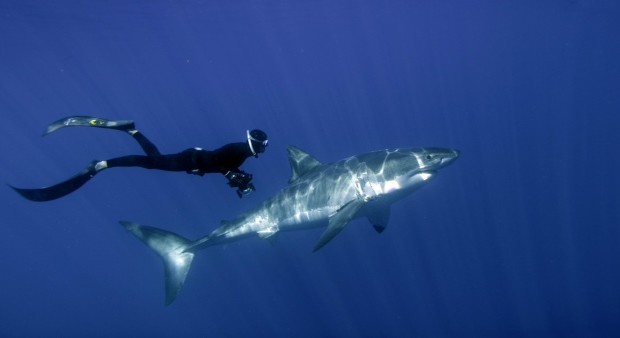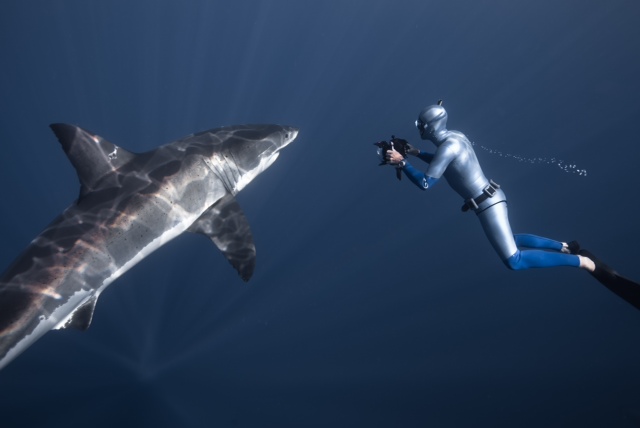William Winram Great White Shark 3D Interview
Welcome to Australia William, tell us a little about how the documentary Great White Shark came to be?
The guys responsible for Stomp, Luke Cresswell and Steve McNicholas were behind the movie and are very passionate about the sea. They wanted to make a documentary film that made a difference with people and to give them a different perspective.
Because these guys are not cut from the traditional documentary filmmaker model, they tell a story and question our fear of the animal, including our perceptions and what you get to see is a very balanced look of the animal. You also get to see the power of the Great Whites and what they are capable of.
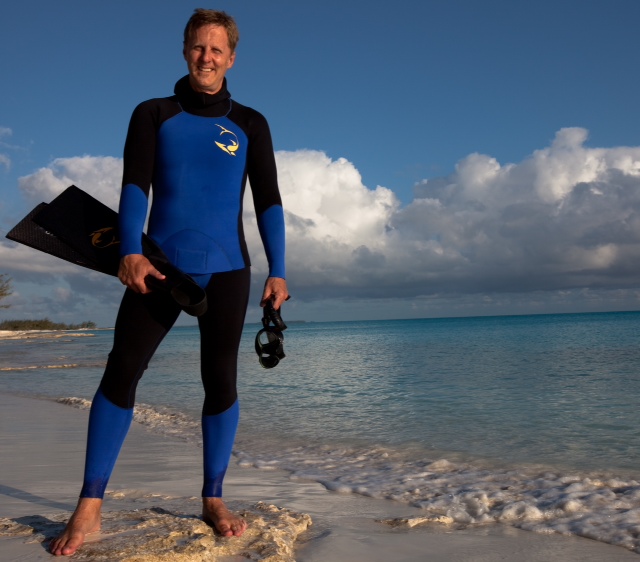
William Winram portrait photo by Michele MONICO
You also get to understand the horror of it such as the film Jaws. Some documentaries make it out that sharks are hunting us and are crazed killing machines. But if they were, how would it be possible for us to swim side by side with the great white shark without getting eaten? It wouldn’t be possible and that’s one of the reason they wanted us in the film to be able to show humans swimming and interacting with great whites.
What was your thoughts when you saw the finished film?
For me, it’s the closest thing you will get to being in the water and coming face to face with a great white shark, especially on IMAX. It’s the closest thing you will get to experiencing what we experience without getting wet.
How did you become involved in the film?
The film was actually filmed in a year but it took an additional 2 years because of a chance meeting. Luke Cresswell was at a London Dive Show and he was sitting in on a talk by Fred Buyle. Fred is a good friend of mine and we do a lot of the tagging together and he’s the guy I want to dive with the great whites. Fred was speaking at the London Dive Show and he had a video playing in the background that he edited from an expedition we did in 2011. As the story goes, Luke picked up his phone and called Steve, the other director and said we’ve not done filming, I’ll tell you about it later.
He was looking for what we were seeing with us in our film for their film. They’ve been in contact with people who dive out of their cages but they were not getting those kind of images that they thought was possible. As a result, they specifically went back Guadalupe to film us. It was by chance, by luck and for us, we were very happy to have the opportunity to participate in the film.
When was the first time you saw your first shark William?
It was a little over 25 years ago and I was in Mexico and nobody wanted to go spear fishing with me so I went alone. That was stupid but I was young and it fitted with who I was at the time. I was about 800 metres from shore and I had killed a fish and I felt something big off to my right. I turned to see a four a half metre tiger shark. I’ve always been fascinated by sharks and did lots of reports and reading on them in school. All the books said that they are man eaters and extremely dangerous.
When I saw the film Jaws, I was even afraid to go swimming in the lake. So imagine being face to face with a four and a half metre “man eater”. I was petrified but during that whole interaction with the animal, it was never aggressive but was actually shy and curious. It followed me all the way into the beach until I dropped all my gear on the sand and sort of chased it to see what it would do and it took off. That started me down the road of what I just encountered, I mean was it a vegetarian shark that I just encountered?
I then done some research to see if anyone else had this experience and I didn’t find anything. You’re not going to find these species of sharks were I grew up on Vancouver Island or when I was doing surf trips so I started going to places to have more interactions with them. At first it was just fleeting glimpses of tiger sharks and then I progressed to learn more about them. So when people say to me I could never do what you do because I’m terrified of sharks, well I was too but I’ve replaced the fear with knowledge.
You mentioned Jaws, do feel that this film has been responsible for western society’s fear of sharks?
Yes, I believe that this was one of those pivotal films for the director and the producers that came at the right moment and gripped the world. It was incredibly scary and scared everyone. I don’t know anyone who has seen it and hasn’t been frightened by it. And it started us down that road of demonising the fish.
What about culling?
I’ve been hearing about culling in the Australian media and culling is not a solution. Culling is an emotional knee-jerk reaction and that number one, you have to find the shark that was involved in it and two, you have to punish it somehow. You’re attaching some kind of human emotion to it and what usually happens when humans cull is that they kill off a large amount of sharks which are crucial to the health of that ecosystem. The whole ecosystem is going to suffer, including fishing.
What’s the theory between great whites breeching?
That footage was shot at Seal Island in South Africa where it’s quite shallow going out and then theres a deep drop. When the sea lions come in from hunting in the open sea they have to come up and over that ledge. The great whites have the option from coming from the deep dark and hit them on the surface. They have so much momentum coming that the only way they can prey on them is to ambush them by lauching themselves out of the water. It’s quite fascinating to watch!
So obviously the human is the apex predator of the Great White Shark but is there a truth that the Orca is also a predator for the Great Whites?
I’ve actually seen a video where a Great White was engrossed in trying to pretty on a baby orca and initially the mother just put itself between its calf and the great white. So after a while it got tired of that and then attacked the great white by ripping it in half. It ate the liver and then just left the carcass. I know they will eat the liver of the great white but they leave the rest of it. But that’s pretty much it with the Orca’s but we’re the most impactful predator. You know were killing sharks in general with around 75 million plus per year.
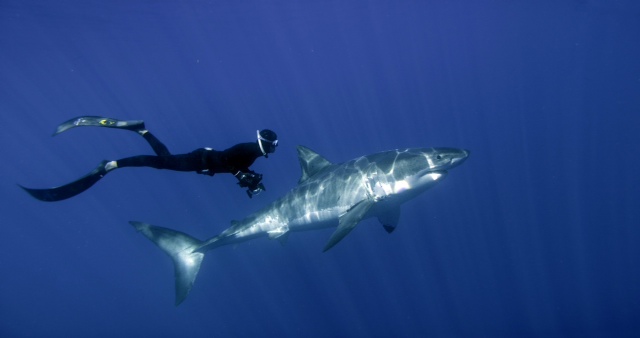
William Winram freediving with a Great White Shark in Isla Guadalupe, Mexico. Still by D.J. Roller
That’s quite a disturbing fact!
That’s one of the reasons I started doing this stuff because I’ve been diving my whole life and there’s places where I use to dive which was never ending with life and now it’s like a desert and we’ve decimated it.
However there is some hope that conservation is working and in the film, you’ll see Dr. Chris Lowe talking about an increase in shark numbers on the West Coast of North America. This is also mirrored by his colleagues in Australia who are seeing the same thing as well. It’s still not a time we can say everything is good but we need to continue.
Finning is a barbaric practice across the world, how can we stop this?
Let me tell you about the history first… Finning was strictly something for the elite of Asia such as royalty or the aristocrats. And then the Asian population exploded, including their wealth. Suddenly this very expensive dish then became available to the masses and it’s incredibly profitable but I think this perspective is changing now. The tall Chinese basketball player Yao Ming has been doing a lot of PR work in China and changing people’s perceptions in getting them to stop using shark fins.
The biggest thing that we can do is social pressure and you could do this in Melbourne. There is a restaurant from where we’re staying in the hotel that serves shark fins. Pressure them and pressure the legislators to ban the import, transit or sale of shark fin. Close ports to them, lobby airlines like Singapore that transports sharks fins.
What people don’t release is that sharks have been demonised and unjustly put into the category of a psychopath but 50% of the oxygen of the air we breathe comes from the sea and we know that sharks are crucial to the health of any marine ecosystem. So if we continue the way we are going, they will become extinct and they’ve seen it in the microcosm of specific reef ecosystems. For example, small algae eating fish eat the algae off the coral which keeps the coral healthy. Bigger fish eat the smaller algae eating fish and then you have sharks who eat the bigger fish. This keeps their numbers in check. When the reef sharks are killed off, the bigger fish over populate and eat up all the smaller fish and the algae takes over the reef and kills it.
I was at a Marine Conference and one of the speakers their said that with conservation there is no PG rating. This is true. Have you see the film Shark water? It’s incredibly depressing and I can’t watch it but everyone I know who has seen it has said it was extremely depressing because there is no solution given. That’s the problem with a lot of environment stuff is that no solutions are given.
It’s just these horrible debilitating facts that pushes people the wrong way. It pushes them to go shopping and enjoy what little time they have left here. They’ve seen the impact with children when environmental news is delivered to them so I think we have to deliver solutions for people that will let them know they do have options.
I mean in one of the screenings, people were saying what can we do? Stop taking plastic bags, just stop. Plastic bags are killing marine life like you can’t believe. That’s a simple solution.
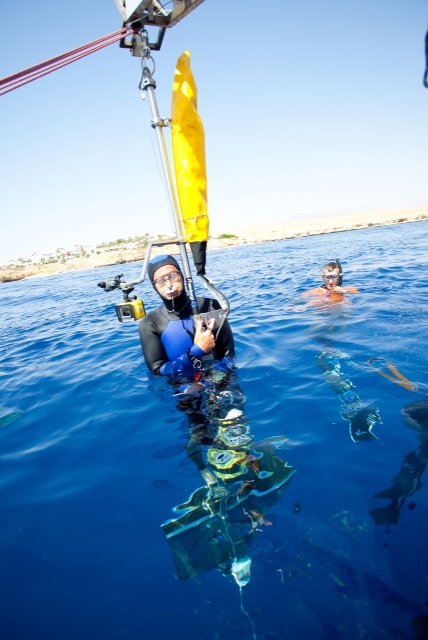
William Winram before 145m VWT – Photo Alice CATTANEO
So what else can we do to increase the world to take notice?
You know what I honestly think? I think there is enough stuff going on around the world but people need to pay attention more because a lot of this goes over their heads. I’ve been suggesting to people where’s your blind spot? And they go what do you mean? Well, I moved from Canada to Switzerland and discovered construction sites were given huge fines if they did not recycle properly.
There are harsh penalties for breaking this law and one of the companies I know about had a painter who threw half a tin of paint into the garbage which is an immediate $50,000 fine if an inspector finds out. He was warned once, the second time he was fired. They also burn their garbage and incinerate it in a way that creates power but has a very little toxic by-product. I look at my birth town in Vancouver which were lobbying to become the most environment friendly city on the planet. Their garbage is put in freight trucks and shipped 1200 miles north and thrown in a hole in the ground and we still think that’s acceptable.
The only way we can solve this problem if we all accept the fact that my neighbour is no longer the guy in the apartment next to me or even the building next to me. We’re all neighbours, whatever you Australians do to your oceans will affect me in Geneva because you’re going to affect my climate and the global climate. You need to ask yourself, so what can I do differently? What I can do to make things better?
The simple thing I tell kids is when you brush your teeth do you leave the water running while you’re brushing? And usually they go uh-huh. Turn it off, where does that water come from? It comes from a plant that cleans it so you have clean drinking water. It takes energy to clean it and when you’re letting it run, you’re wasting energy and the kids go “oh ok” and you see them nodding going yeah yeah. Ok, ask mommy and daddy not to use plastic bags. This is how we’re going to make a difference by looking at ourselves and saying what can I do better? You know, do I leave the lights on in every room in the house when I’m actually only in one room? Am I using environment friendly appliances? It’s never ending.
Lastly William, what was the highlight of the film for you?
I’m kind of biased [laugh] I like the whole film and how the music and narration takes you on a jhourney. I love Bill Nighy as an actor and I love his voice in the film. But I love the way they’ve sequences it together so that the closing shots with Fred and I swimming peacefully side by side with a Great White fuels the mood of the film and it completes the journey. A
As one viewer said to me in Montreal where we launched the film said, I’m here because my wife is a shark nut and I never really cared about sharks, particualry the great white as I’ve seen Jaws. And he said but god, I love this film and we’re going to bring our kids back. I love these things, they are amazing, I’ve never would have thought that you could say they are beautiful. The guy was getting really excited about and was not a fan of sharks prior to seeing the film. He changed.
Hopefully others can take a similar experience away as well?
Definitely. We’re also not saying that Great Whites are cute and cuddly animals and everone should dive with them but we’re saying that they are an important part of the ecosystem that we should be trying to protrect them and they are not these crazed killing machines that we’re representing them as. You will see in the closing scenes of the film that if this was true, there would be no way in the world that we could be doing that with them, especially how they’ve been portrayed. No way.
Thanks for your time William and all the best for the film and your future work.
GREAT WHITE SHARK 3D
Opens: 1st January
Sneak peak sessions from Dec 27!
Great White Shark 3D takes you up close and personal with the world’s most iconic predator! This new IMAX 3D film, unravels the mystery of the creature we love to fear — the much maligned, misrepresented and misunderstood great white shark — and goes to the depths of human daring to tell the true story of its role atop the oceanic food chain.
http://www.imaxmelbourne.com.au/movie/great_white_shark_3d
To show your support against shark finning, please visit http://www.stopsharkfinning.net/


